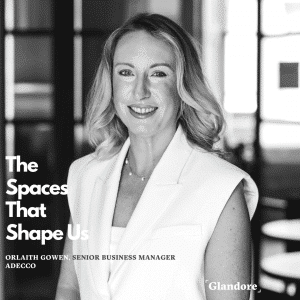The Spaces That Shape Us: Orlaith Gowen
Orlaith Gowen - Senior Business Manager, Adecco Group UK & Ireland

Growing up, nobody thinks, I’m going to work in recruitment when I’m older. It’s an odd one. You might hear people say they want to work in marketing, or maybe HR, but you’ll rarely meet a university-bound student who announces, “You know what? I’m going to be a recruiter.”
But here I am, a Senior Business Manager for Adecco Ireland, part of the Adecco Group, a global solutions provider. At Adecco Ireland, we support organisations across Ireland in hiring for all sorts of roles-–from temporary to contract to permanent placements. We also work on behalf of our candidates, interviewing them, helping them find their dream career, guiding them through the interview process and providing three months of aftercare and ongoing support as they settle into the role.
And I love it. I’ve been with the company for 12 years now. As a people leader, I don’t do as much direct recruitment myself anymore—unless it’s for senior executive roles. Instead, I lead our team in Cork, which covers certain verticals nationwide; coach recruiters; handle client relationships and manage the overall team success. But when I started at Adecco as a recruiter, I loved the fast pace—the fact that no two days were ever the same—and that hasn’t changed.
Still, I didn’t wake up one day and think, You know what? I’m going to be a recruiter.
The phone rang twice
Many moons ago, I began my career at Debenhams which was then Roches Stores, working at the Topshop concession. When I relocated to Dublin, I moved into retail management, launching a Mint Velvet concession at the House of Fraser. It was my first managerial role, and I spent a couple of years overseeing a small team, and I loved that.
While the people-focused side of retail really suited me, the lifestyle didn’t—I couldn’t stand the late nights, the weekends and all those long Christmas hours. I decided to try something completely different and took a job doing sales and marketing for a childcare company which being honest, I wasn’t great at.
Eventually, I decided to move back to Cork. When I started looking for jobs there, I found myself checking out retail management again. Part of me missed it, but I kept thinking, Do I really want to get back into all that?
Then, I interviewed for a role at Adecco. Honestly, I wasn’t exactly sure what recruitment involved, but the job seemed to match my skills, and the hours sounded ideal.
But when the manager called back to offer me the position, I had a crisis of confidence and turned it down. As soon as I hung up, I knew I’d made a mistake. I was just afraid of the challenge—of failure—and I should have thrown myself at it rather than running away. I remember thinking, Now, look at what you’ve done. You’re going to wind up back in retail, and in a couple of months, you’ll be giving out about it again.
Then, the phone rang again. The manager was calling back. She was just curious why I’d turned down the job. I told her that I completely regretted my decision and asked if I could reconsider. She acknowledged it was a risk—after all, I’d just said no—but she decided to give me a chance.
I began as a consultant—and because I knew nothing about recruitment, it was tough. I had a lot to learn. I had to bring in clients, get people placed into the correct roles, manage payroll back before everything was online and even pick up some basic computer skills.
But I loved the buzz of it. Before Covid-19, we did a lot of temporary recruitment, which is incredibly fast-paced. A client might call in the morning needing someone to cover a 7:00 pm shift that night. It could be stressful—and plenty of difficult situations popped up each day—but I always felt good about what I’d achieved. I knew I’d done something that had helped someone, even in a small way.
After about a year and half, I moved on from temporary, high-volume warehouse recruitment into commercial recruitment—permanent hiring for business roles. That meant I got to work more directly with candidates and get to know them. You’d meet someone who was out of work or unhappy at their job, and you’d help them find and secure something new. Then, you’d get to see them genuinely happy in their new role. How could you not love that?
Before long, I was put up for our management training course and given the opportunity to take a secondment at our Galway office, managing a small office and throwing myself out of my comfort zone. While I was there, my original manager—the one who’d called back and taken a chance on me—decided to move on, so I applied for her position. I got the role, came back to Cork, and have been here for nine years now. And if there’s one thing that’s shaped me as much as the people I’ve encountered during that time, it was our office space.
Connections forged in fire
When I began working with Adecco, our Cork office was in the middle of city centre. It was an old-school recruitment office that functioned a bit like a retail space. People didn’t have to make appointments—they could just walk in off the street with their paper CV—so we regularly met all types of characters and found ourselves in interesting situations.
Beyond that, though, the office was in shambles. It was an old building with all sorts of problems. You know that old expression “If these walls could talk”? Well, if those walls could talk, they’d tell you about floods, sewage problems and the no-smoking sign was still hanging on the kitchen wall from when it was legal to smoke in dedicated areas of workspaces!
Square footage-wise, the office was large. We had our own bathroom and an interview room. However, there was also an upstairs space that had once been an office, but had long ago been deemed unsafe, so nobody went up there. Then, one night, a fire broke out in a different office upstairs, I had to let the fire brigade in, and afterwards, I went to bed thinking that I’d been a good Samaritan, but, the next morning, when my colleagues and I arrived at the office, we discovered it had flooded overnight. The water from the fire hoses had come straight through the ceiling.
It was awful. We gave out about the place, got angry and laughed helplessly at our situation—because we couldn’t move. Whoever opened the office had signed up to a 25-year lease, and I used to think, I’ll never be here when that lease is finally up.
But I was. Luckily for me, I’d progressed with the company, so I got to be involved in selecting our next office space.
However, when we locked the doors of that office for the last time, I couldn’t help feeling a bit sad. As desperate as that office was, we had so many stories to tell from it. I’d worked with so many great colleagues there over the years, and all the unpredictable things that happened really shaped us as a team. Although people have moved on to other places, a lot of us are still friends, and we still laugh about all the ridiculous things we had to deal with in that office.
A new lease
Pre-Covid, our team knew the 25-year lease would soon (finally) end. Initially, because I was planning to grow the team, we imagined needing a large office with space for all our staff, plus dedicated meeting rooms, an interview room and a kitchen. Then the pandemic hit, and remote working became the norm. By 2022, we knew we’d adopt a hybrid model, which changed the type of office we needed.
Flexible spaces suddenly felt like a viable option. I started thinking we’d be better off in a serviced, inclusive space—somewhere we could have our own office but share access to interview rooms, meeting pods, kitchens and more.
We visited a few co-working spaces, but I was particularly keen to consider Glandore. They’d been a client of ours a few years earlier. I’d also attended a few events there, including a fantastic International Women’s Day session called Hear From Her. I remember saying to a colleague at the time, “Can you imagine if this was our office? It’s stunning.”
I suggested to our properties team that we book a viewing, and everyone loved it immediately, the people working here make it extra welcoming. Having an office within a shared space works especially well for a smaller team like ours. Glandore has a great atmosphere—they host monthly member lunches and informal after-work events like pizza and beer. Even when small teams get along brilliantly, they can struggle to generate that fun energised buzz you find in a larger office. At Glandore, we’re part of a vibrant culture made up of many different organisations.
Last year, Glandore hosted a summer party on a boat, and we turned it into our team night out. We booked their boardroom for our mid-year operations meetings, then spent the evening chatting with people and enjoying ourselves.
Funnily enough, since moving into Glandore, I’ve bumped into two people working at other companies, both of whom I’d helped place into their current roles. I hadn’t seen them in years, but now we chat regularly at Glandore’s lunches and holiday parties. It’s a lovely feeling—we’re not colleagues, but I played a part in their career journeys, and it’s really rewarding to see them happy at work.
People often talk about being happy in your job because we spend so much of our lives working. Because I work in recruitment, that makes sense to me—after all, my whole job revolves around matching people with roles that genuinely suit them. But happiness at work isn’t only about the job itself; it’s also about your environment—the culture, the people, and the place.
Read more about Glandore’s Flexible Workspaces



